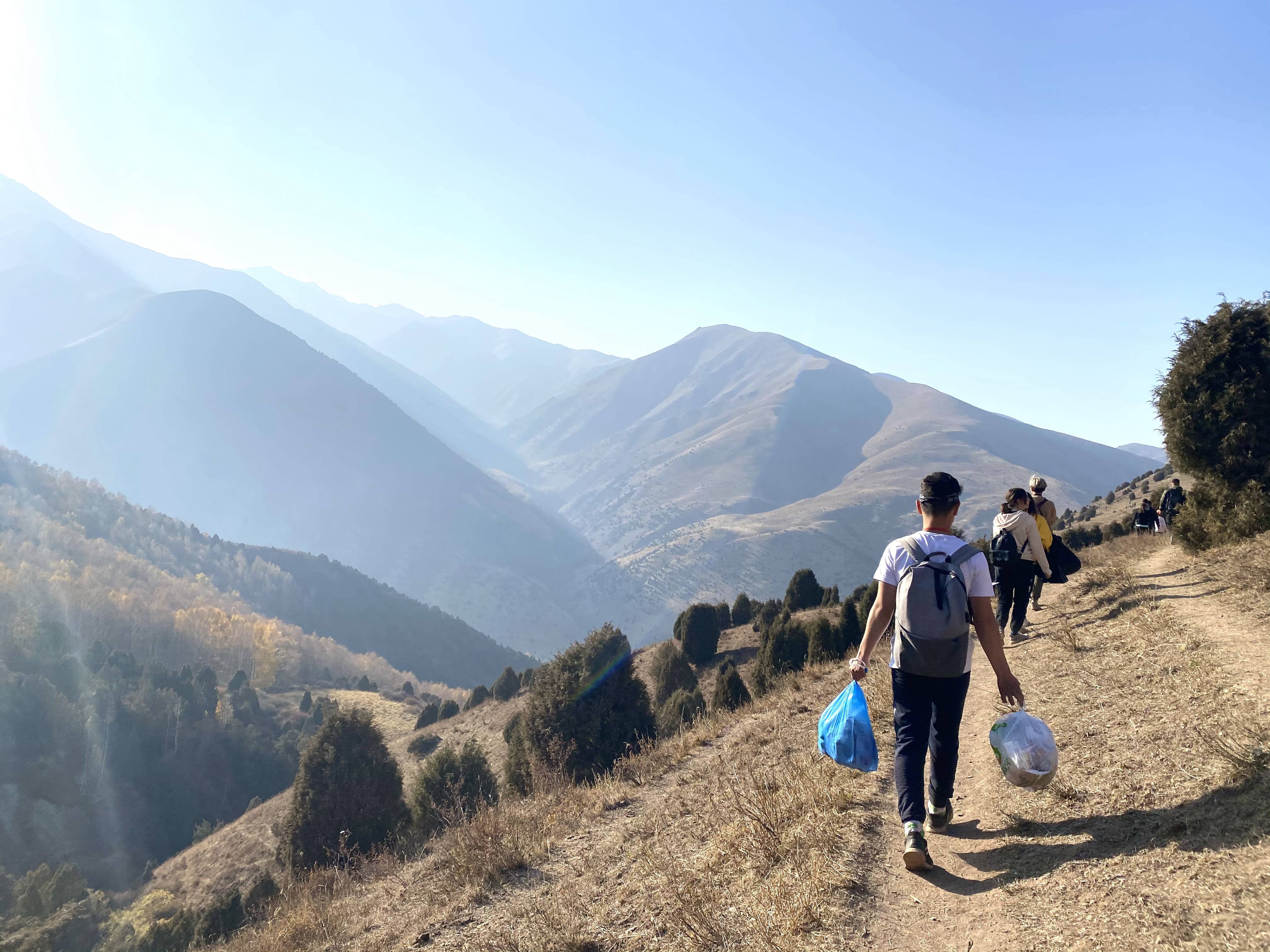
In recent years, and before COVID-19, Kyrgyzstan has been featured as a new “off-the-beaten-track” travel destination among many popular international travel lists. Set as one of the priority sectors in the Kyrgyz National Development Strategy for 2018-2040, tourism has been recognized as a potential driver to boost economic growth in the country.
With the increasing demand of tourism services, businesses have been projected to increase their energy and water use, waste generation and GHG emissions. In this scenario, the uptake of sustainable consumption and production (SCP) patterns and the promotion of a Sustainable Tourism that is in line with the 2030 Agenda for Sustainable Development is a must in Kyrgyzstan.
Launched in March 2020, the EU SWITCH-Asia PERETO project is designed to promote energy security and sustainable growth among businesses and consumers in the tourism sector by addressing awareness and infrastructural challenges, management and marketing strategies, access to financial instruments, and fostering political dialogue and Government support for the tourism sector.
The effects of the pandemic and the country-wide lockdown brought an array of new challenges and exposed previous chronic problems. Highly dependent on the seasonal inflow of international visitors, Kyrgyzstan’s tourism sector is one among the hardest to be hit by the crisis, with businesses being increasingly forced to shut-down or reduce their operations. In this context, also the PERETO project had to re-adapt and reinvent its approach, helping the tourism sector to adjust to the new reality.
When global tourism is put on hold, there is no better alternative than to boost sustainable domestic tourism!
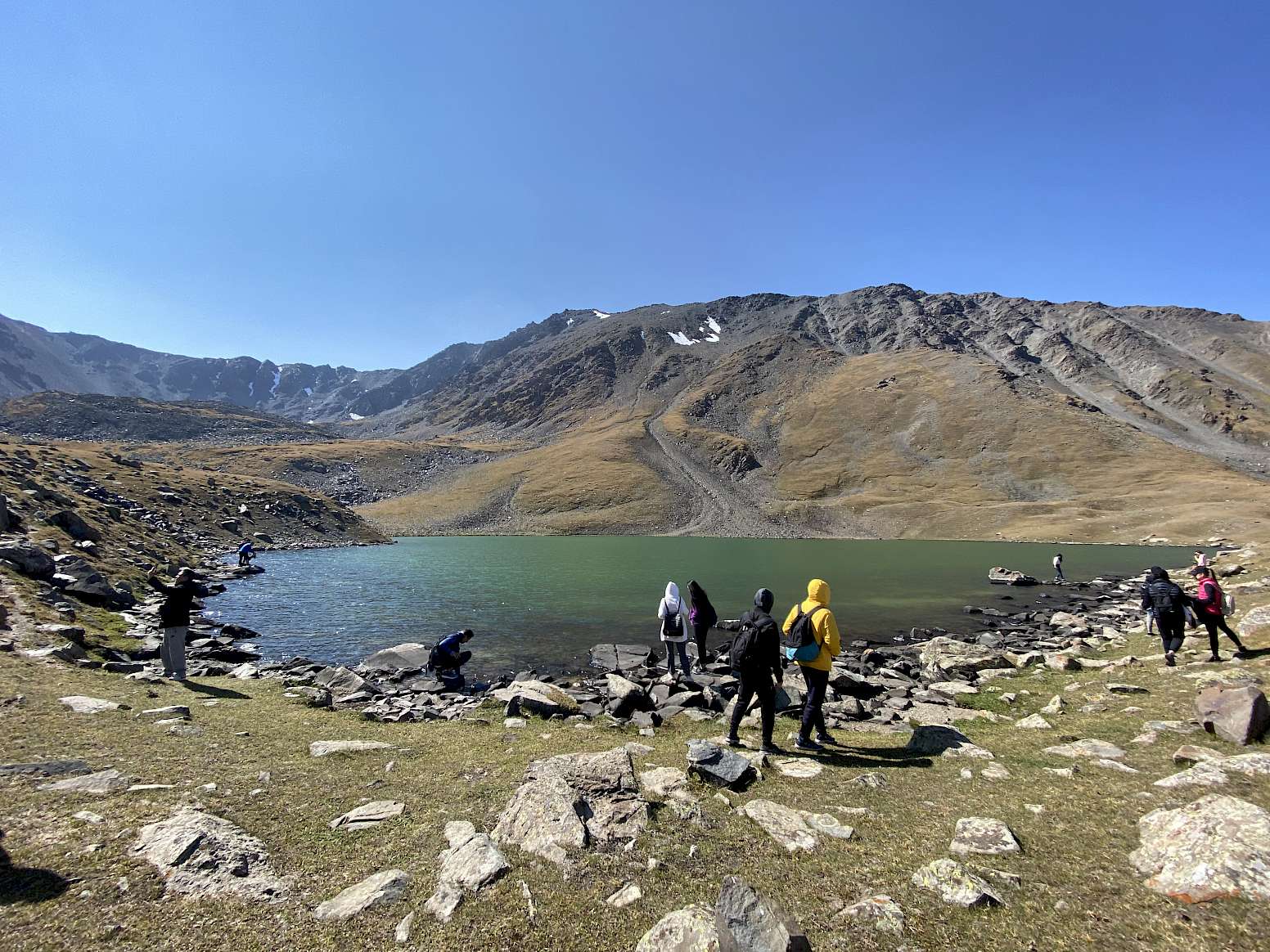
Re-discovering, bringing value and increasing the demand of domestic tourism in Kyrgyzstan was one of the key strategies adopted by the project. Working on the demand and supply sides of the tourism sector, PERETO has been a strong advocate in the promotion of sustainability, including educating consumers on more responsible alternatives that can benefit both people and the environment.
Kyrgyzstan has been considered an “off-the-beaten-track” destination not only among international tourists but also among local residents. With numerous mountain hiking trails located just a few hours away from Bishkek, the country’s capital, eco-tourism experiences and a full immersion in nature are the perfect solution to regenerate one’s body and mind.
The current challenges facing public transportation, however, have made these trails accessible only through the help of an increasing number of small tour companies providing transport and guide services. Surprisingly, many of these small enterprises gained most of their visibility during the summer of 2020, in the midst of the pandemic.
NaMars.kg, for instance, is a young tour company which started its business in August 2020. The company provides one or two-days long hiking trips and, its unique feature is that it is run entirely by youths, high schoolers and college students. What distinguishes NaMars.kg from other companies is its strong “eco-stance” and attention to sustainability issues.
Hence, PERETO has jointly launched with them SAKTA – which in Kyrgyz language means “TO SAVE”.
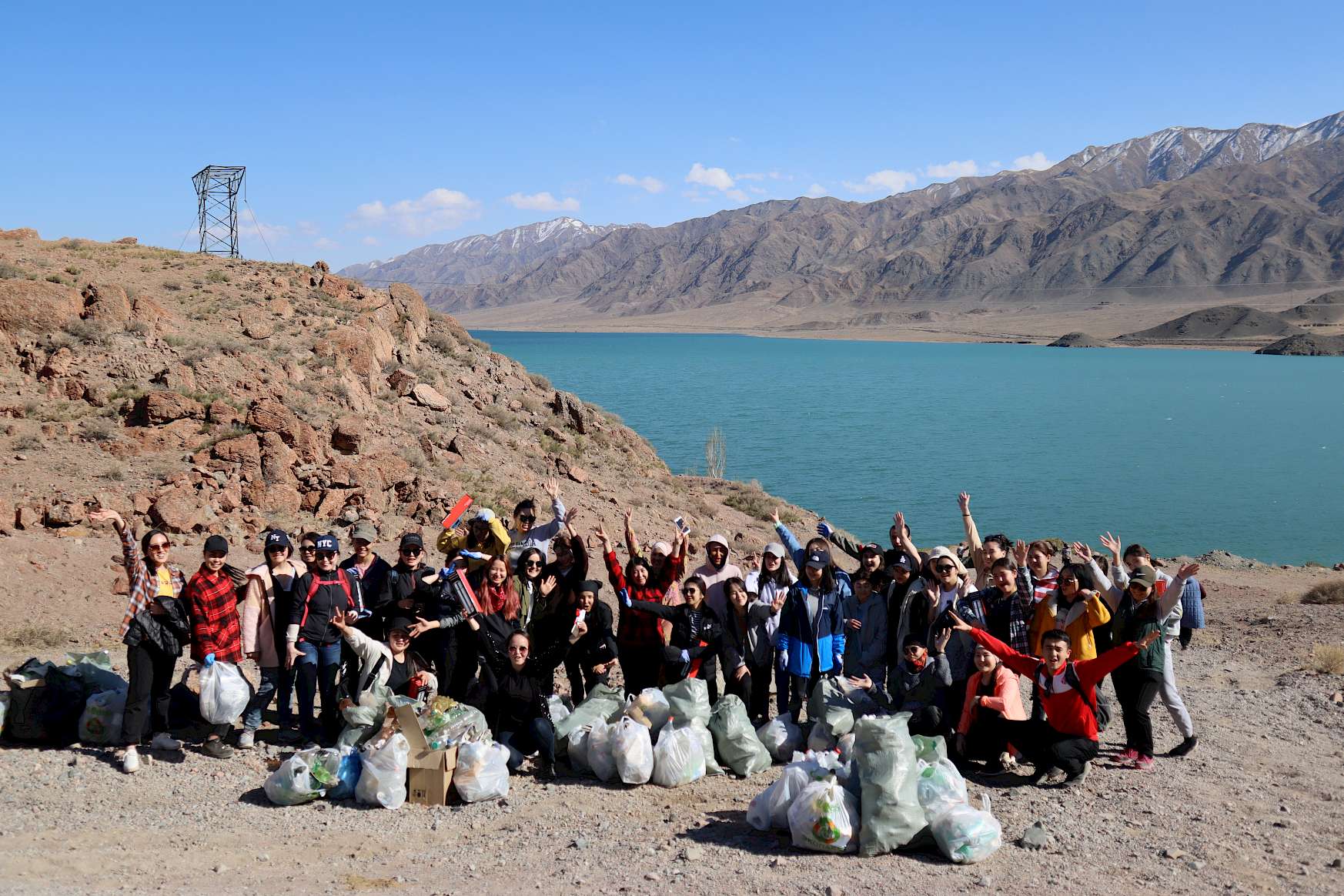
The SAKTA eco-movement invites youths to support domestic tourism, switch to sustainable consumption and production habits, and preserve nature.
In April 2021, PERETO and NaMars.kg organized the first cleanup activity at the Orto-Tokoi water reservoir, one that feeds with irrigational water around one hundred hectares of land in Kyrgyzstan and its neighboring country Kazakhstan. During the winter, the frozen reservoir is popular among tourists for being a natural ice-skating zone. Unfortunately, some visitors leave their trash at the reservoir, therefore, cleaning up this location is critical in order to reduce the negative environmental impact caused by decaying waste.
In partnership with Tazar, a mobile application providing a map of recycling locations and ‘garbage’ (secondary raw materials) collection services, during the cleanup, 50 participants were given a brief training on garbage sorting and the dangers of microplastics.
SAKTA supporters collected 110 trash bags in less than 40 minutes. Unfortunately, most of this couldn’t be recycled due to the condition of its decaying process. Nevertheless, all bags were brought to the garbage collection point TazaBalykchi, which sorts, washes and cleans items that could be restored and used for recycling.
The SAKTA movement and its new allies, further organized a series of monthly cleanups near the Issyk-Ata waterfall and Alamedin gorge. Participants actively took part in the eco games prepared by tour guides, while collecting and sorting trash at the hiking trails. Also important to stress is that the monthly cleanup trips are self-funded by participants. This shows their strong commitment to join the eco-movement.
By combining cleanups and recreational activities, the SAKTA intends to lead by example by showing and teaching the proper way of mountain hiking and helping tourists re-discover Kyrgyzstan's natural wonders.
Targeting youths was also an important decision of this project. The greatest potential to shape the future of the tourism industry and redirect it towards the uptake of more sustainable consumption and production practices is in the hands of young generations. PERETO aims to build the foundation for a behavioral change which would further accelerate the supply of eco-services among businesses.
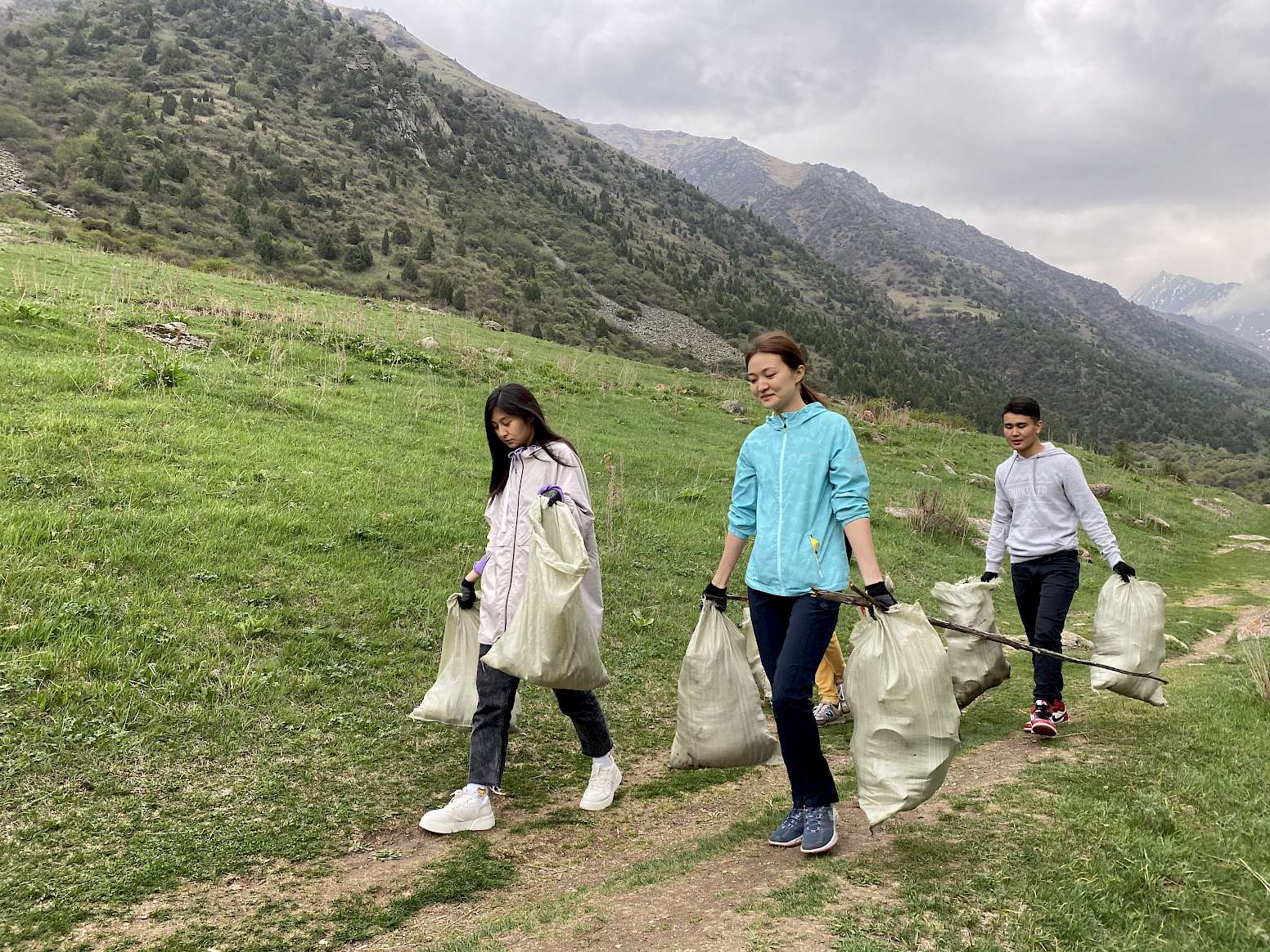
Supporting the Hospitality, Restaurant and Catering (HoReCa) Sector
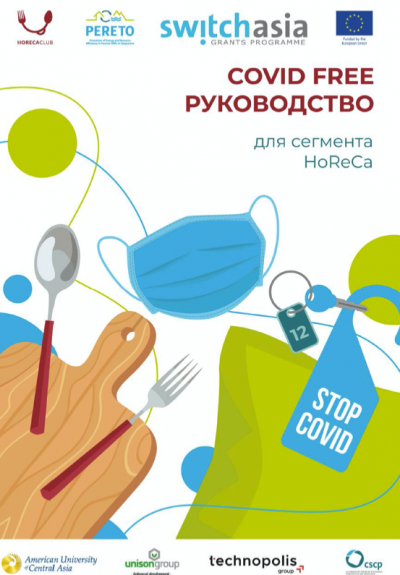 The Hospitality, Restaurant and Catering (HoReCa) sector in Kyrgyzstan was also highly affected by the strict COVID-19 measures. Businesses are facing limitations on occupancy rates due to the need for social distancing. They also had to alter business operations to compensate for losses. While some actively utilized online order and delivery services, others struggled with this transition. To respond to these challenges, the PERETO project and the Association HoReCa Club prepared the COVID-Free Guidance.
The Hospitality, Restaurant and Catering (HoReCa) sector in Kyrgyzstan was also highly affected by the strict COVID-19 measures. Businesses are facing limitations on occupancy rates due to the need for social distancing. They also had to alter business operations to compensate for losses. While some actively utilized online order and delivery services, others struggled with this transition. To respond to these challenges, the PERETO project and the Association HoReCa Club prepared the COVID-Free Guidance.
Along the re-discovery process, PERETO has been actively advocating for domestic tourism and encouraging businesses to take this opportunity to expand and upgrade their services, implement green measures and promote and sell their services taking a new “green marketing” approach. During the first year of implementation, the project established partnerships with various business associations and institutions. A baseline study assessment among businesses was also conducted to determine current challenges and needs.
Several training programmes for regional consultants are also being conducted to help businesses upgrade and retrofit their buildings and facilities. While others are being prepared and targeted to businesses, tackling green measures and technologies to efficiently reduce energy and water use, waste generation and GHG emissions. The trainings aim to attract three hundred small and medium enterprises (SMEs) working in the tourism sector.
What’s ahead of us?
The PERETO project will continue its active partnership in the SAKTA movement by facilitating various activities at the hiking trails and educating youths about sustainable consumption and production patterns. Most importantly, the project will create and strengthen networks among tourism businesses who will also join the training programmes. Support will be provided to fifty tourism businesses that will pilot the implementation of energy and resource efficient measures.
Stay tuned to learn more about the PERETO project. Follow us on Facebook, Instagram and our website.
Photo credits: © PERETO Project, Kyrgyzstan


